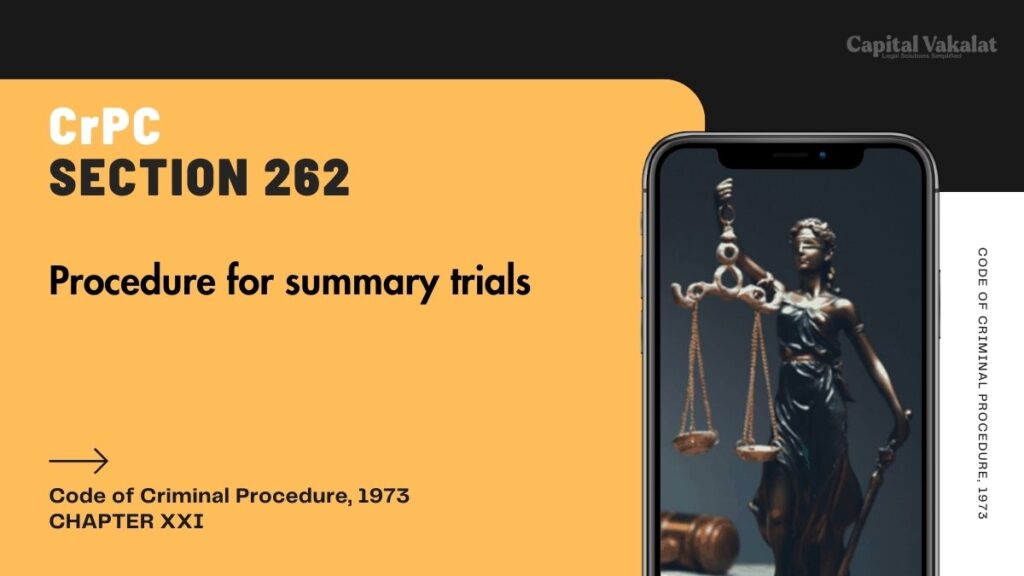Navigating the complexities of the legal system can often be daunting. However, understanding specific sections, like Section 262 of the Code of Criminal Procedure (CRPC), can significantly demystify the process. This section specifically deals with the procedure for summary trials, which are designed to expedite the judicial process and reduce the burden on courts. In this comprehensive guide, we’ll delve into the intricacies of Section 262 CRPC, providing a clear and detailed overview.

The Code of Criminal Procedure (CRPC) of India lays down the procedural law for conducting criminal trials. Among its many provisions, Section 262 stands out for its focus on summary trials. Summary trials are crucial for handling cases that require swift justice, particularly those involving minor offenses. They are characterized by their simplified procedure and expedited handling, ensuring that justice is not delayed due to procedural complexities.
Bare Act. Section 262 Cr.P.C.
Procedure for summary trials.
(1) In trials under this Chapter, the procedure specified in this Code for the trial of summons-case shall be followed except as hereinafter mentioned.
(2) No sentence of imprisonment for a term exceeding three months shall be passed in the case of any conviction under this Chapter.
Understanding Section 262 CRPC
Section 262 CRPC outlines the specific procedures to be followed during summary trials. These trials are generally conducted for offenses that are less severe, thereby necessitating a quicker resolution. The section mandates that such trials should adhere to the following guidelines:
- Simplified Procedure: Summary trials under Section 262 CRPC involve a more straightforward process compared to regular trials. This is essential for handling less serious offenses efficiently.
- Limited Sentence: The punishment in summary trials is typically less severe, with the maximum imprisonment not exceeding three months.
- Speedy Resolution: The primary objective is to ensure a quick trial, minimizing the time spent on each case and thereby reducing the backlog in courts.
Criteria for Summary Trials
Summary trials are not applicable to all criminal cases. Section 260 CRPC specifies the types of offenses that can be tried summarily. These include:
- Offenses not punishable with death, life imprisonment, or imprisonment exceeding two years.
- Offenses such as theft (where the value of stolen property does not exceed Rs. 2000), receiving stolen property, and house-trespass.
Procedure for Summary Trials under Section 262 CRPC
The procedure for conducting summary trials under Section 262 CRPC is designed to be less cumbersome, promoting efficiency and speed. The steps include:
1. Summons Procedure: The accused is summoned to court through a simplified process, ensuring they are informed of the charges and the trial date promptly.
2. Simplified Pleadings: In summary trials, the pleadings are concise, focusing on the core facts of the case without extensive documentation.
3. Swift Evidence Presentation: Evidence is presented in a streamlined manner, with witnesses often providing oral testimony to expedite proceedings.
4. Prompt Judgment: The court aims to deliver a judgment swiftly, usually on the same day as the trial or shortly thereafter.
5. Limited Sentencing: If found guilty, the sentencing is typically brief, adhering to the constraints set by the CRPC for summary trials.
Importance of Section 262 CRPC in the Legal System
Section 262 CRPC plays a vital role in ensuring the efficiency of the legal system. By enabling summary trials, it helps in:
- Reducing Backlogs: Summary trials help in swiftly disposing of minor cases, significantly reducing the backlog in courts.
- Efficient Resource Utilization: They allow for more efficient use of judicial resources, freeing up time and effort for more complex cases.
- Speedy Justice: For minor offenses, it ensures that justice is delivered quickly, maintaining public confidence in the legal system.
Challenges and Criticisms of Summary Trials
While summary trials under Section 262 CRPC offer numerous benefits, they are not without challenges and criticisms:
- Potential for Oversight: The expedited nature of summary trials can sometimes lead to oversights, impacting the thoroughness of the judicial process.
- Fairness Concerns: Critics argue that the simplified procedures might compromise the fairness of the trial, particularly in ensuring the accused’s rights are fully protected.
- Resource Constraints: Despite their efficiency, summary trials still require adequate judicial resources and infrastructure to function effectively.
Conclusion
Section 262 CRPC and the procedure for summary trials are pivotal in enhancing the efficiency of the Indian legal system. By simplifying and expediting the trial process for minor offenses, this section helps in delivering swift justice and reducing the burden on courts. However, it is essential to address the challenges and ensure that the rights of the accused are protected, maintaining the balance between efficiency and fairness. Understanding the intricacies of this section can empower individuals to navigate the legal system more effectively and appreciate the efforts towards a more efficient judicial process.